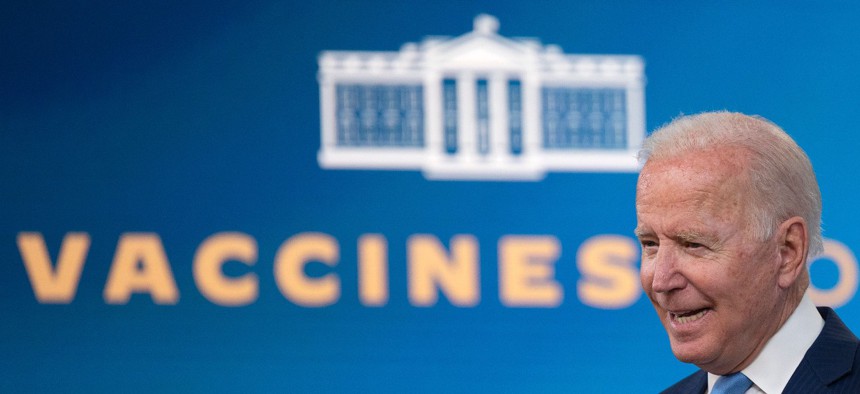
The White House has estimated it will spend up to an extra $5 million per week the injunction is in place on testing unvaccinated employees for COVID-19. JIM WATSON/Getty Images
Feds' Vaccine Mandate Enforcement Could Be Days Away, but Agencies Are Not Yet Prepping
The clock is ticking on a federal court to either hear another appeal on Biden's mandate or allow the administration to resume suspensions and firings.
The Biden administration could soon be able to start suspending and firing the remaining federal employees who have yet to receive a COVID-19 vaccine, but agencies are not yet taking steps to prepare for that outcome.
A federal appeals court in April struck down a nationwide injunction that had paused the enforcement of President Biden’s mandate, but enforcement was stalled due to a standard buffer period after the judges’ ruling. The mandate was set to go into effect Tuesday, but a petition from those challenging the mandate for a rehearing from the entire U.S. Court of Appeals for the Fifth Circuit has further delayed the Biden administration from taking action on employees out of compliance with the requirement. The Justice Department had asked the court to immediately allow it to resume enforcement, but the court has opted to let the secondary appeal play out.
The court last week asked Justice to respond to the plaintiffs request for an en banc hearing by Thursday, making a ruling likely on Friday at the earliest. The judges could opt to immediately put the mandate back into effect, but typically it would apply another seven-day buffer period. That would make the earliest date the requirement could take effect June 10.
Such an outcome is far from guaranteed, however. First, the court could grant the petition, allowing the injunction to remain in effect as the full Fifth Circuit hears the case. Alternatively, the court could further delay enforcement of suspensions and firings for unvaccinated feds by staying the injunction’s revocation until the plaintiffs fully exhaust their appeals rights. Those challenging the mandate—the group Feds for Medical Freedom and a union representing some Homeland Security Department employees—have asked the Fifth Circuit to do just that if it rejects an en banc hearing so it can take its case to the Supreme Court.
The Supreme Court may be less inclined to weigh in on the case, as it already ruled on two vaccine mandate cases in January. It allowed a requirement on health care workers to remain in effect, but invalidated another one that applied to large, private-sector employers.
The White House has instructed agencies to maintain the status quo while all of this has played out. An Office of Management and Budget official noted the preliminary injunction remains in effect and agencies, and the Safer Federal Workforce Taskforce, are not taking any steps to prepare for enforcement. They are not processing or adjudicating requests for religious or medical exemptions, nor can they take any preparations for doling out disciplinary actions. Many agencies were on the precipice of beginning suspensions when the nationwide injunction went into effect.
At that time, about 98% of federal workers were in compliance with the order. That still leaves about 40,000 employees vulnerable to suspensions and firing if the mandate goes back into effect, plus any workers whose exemption requests are denied.
In a 2-1 decision in April, the three-judge Fifth Circuit panel said the plaintiffs did not have standing in the federal circuit and must instead pursue their appeals through the Merit Systems Protection Board or Office of Special Counsel as laid out in the Civil Service Reform Act. The court vacated the injunction and instructed the district court in Texas that issued it to dismiss the case upon remand, though that order still has not taken effect.
Most agencies began bringing employees back to their offices in April or May and had hoped to ensure all non-exempted workers were vaccinated as they did so. The White House has estimated it will spend up to an extra $5 million per week the injunction is in place on testing unvaccinated employees for COVID-19.
The Veterans Affairs Department has served as a test case for the Biden administration, as its vaccine mandate for most employees was issued separately from Biden's and has remained in effect. As of late-April, it had fired just six employees for non-compliance.







